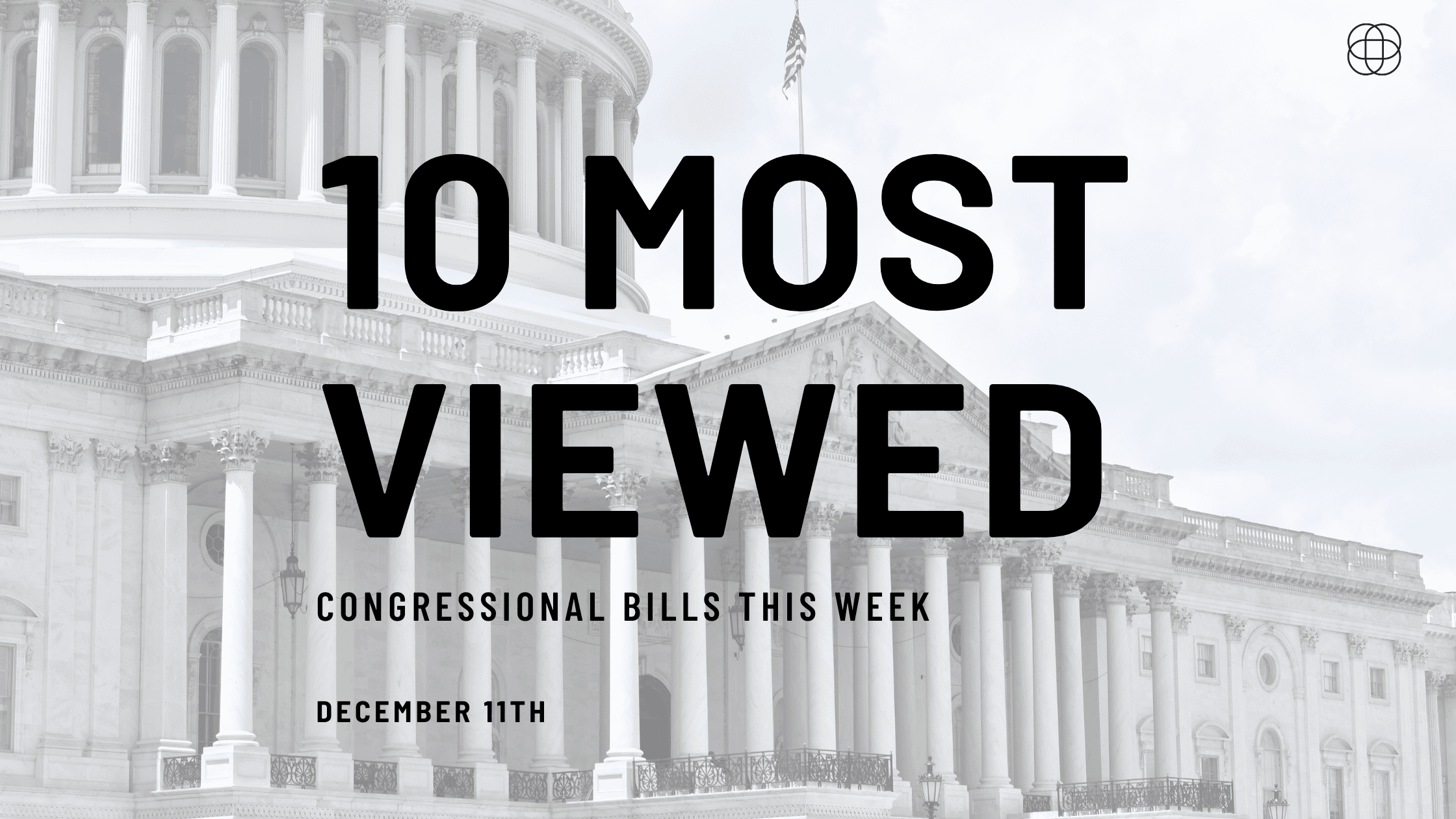There are a number of important bills that you should be aware of that are brought for congressional consideration. Below is a list of the congressional bills that are being viewed the most based on data from congress.gov. From the Respect for Marriage Act to the Eagle Act, these bills will have a major impact on the future of the United States. In addition, the National Defense Authorization Act for Fiscal Year 2023, the Inflation Reduction Act of 2022, and the Veteran Service Recognition Act of 2022 are all important pieces of legislation that you should be aware of. Finally, the Marijuana Opportunity Reinvestment and Expungement Act of 2022 is a bill that will have a significant impact on the marijuana industry. So make sure to keep an eye on these bills this week and be prepared to voice your opinion on them!
1. Respect For Marriage Act
The Senate introduced the Respect for Marriage Act which would provide a number of important protections for same-sex couples. The bill has 33 co-sponsors and is supported by a wide range of civil rights organizations. The main purpose of the bill is to ensure that no federal civil or criminal statute shall prohibit or recognize a marriage between two people of the same sex, regardless of whether that state recognizes such marriages. This would overturn various bans on same-sex marriage currently in place in federal law.
The bill also prohibits the federal government from taking any discriminatory action against any state that recognizes such marriages. This would ensure that LGBT couples have full protection under federal law, no matter where they live. Finally, the bill amends the Immigration and Nationality Act to treat as a spouse an individual married to someone of the same sex. This provision is important because it ensures that LGBT couples have legal rights and benefits similar to those enjoyed by straight couples.
Lastly, the Respect for Marriage Act repeals Section 3 of DOMA – known as the Defense of Marriage Act. This law was passed in 1996 and prohibited legally married gay couples from receiving federal benefits related to their marriages, such as Social Security survivor’s benefits or estate tax exemptions. repealing Section 3 will finally give full recognition to all lawful marriages in America and remove one barrier holding back gay families from reaching their full potential.
2. Eagle Act (Equal Access to Green cards for Legal Employment Act)
On June 1, 2021, Representatives Lofgren (D-CA) and Curtis (R-UT) introduced the Equal Access to Green Cards for Legal Employment (EAGLE) Act of 2021 (H.R. 3648). This bill aims to solve the US immigration policy dilemma as it relates to employment.
The bill would:
– Increase family-based per country limits from 7 percent to 15 percent.
– Eliminate employment-based per country limitations.
– Provides a 9-year transition period for the EB-2 and EB-3 preference categories.
– Reserves 5.75 percent of visas for consular processing cases during the transition.
– Reserve 4,400 EB-3 visas for nurses and Physical Therapists for the first 7 years.
– Establish new H-1B petition and labor condition application requirements.
– Create a temporary ability for certain nonimmigrants to file an adjustment of status (AOS) application even before a visa becomes immediately available if their I-140 petition has been approved for 2 years.
3. National Defense Authorization Act For Fiscal Year 2023
After months of negotiations, Congressional Republicans and Democrats came to an agreement on the National Defense Authorization Act for Fiscal Year 2023. The bill authorizes $722 billion for defense spending and includes a provision that would prohibit the president from using military force against Iran without congressional approval.
While this bill still needs to be passed by the Senate and signed by the President, if it is passed it would be the first time in nearly two decades that Congress has passed the NDAA on time. This is a huge victory for both Republicans and Democrats, as it shows that they can work together to get things done.
This bill is important not just because of its financial implications, but because it marks a return to normalcy after years of partisan gridlock. It’s hoped that this bill will help to strengthen America’s national security and revive economic growth – two issues that have been slow to recover in recent years.
4. Inflation Reduction Act Of 2022
Congress will be voting on two important pieces of legislation: The Reduce Inflation for American Families Act and the Tax Cuts and Jobs Act. Both bills have been endorsed by a majority of congressional Republicans, and they have been heavily criticized by some Democrats.
The Reduce Inflation for American Families Act is a bill that would cap the growth of government spending at two percent annually. This would reduce the federal deficit by $3.3 trillion over ten years, and it would cut taxes for businesses and individuals. The bill has been endorsed by the US Chamber of Commerce and the National Association of Manufacturers, both of whom argue that it would help to spur economic growth in America.
The Tax Cuts and Jobs Act is a bill that would reduce marginal tax rates across all income levels, eliminate most itemized deductions, and expand the child tax credit. These changes are expected to lead to increased job creation in America, as well as higher wages for working families. The bill has also been endorsed by the US Chamber of Commerce and the National Association of Manufacturers, who argue that it will help to drive GDP growth in America above three percent annually.
Despite its broad support among Republicans in Congress, The Reduce Inflation for American Families Act has been criticized by some Democrats who argue that it would hurt the economy overall. They worry that if government spending is not restrained, there may be no way to rein in future inflationary spikes. However, despite these criticisms, it seems likely that The Reduce Inflation for American Families Act will be passed into law this week – making it one of Congress’ most significant achievements this year!
5. Veteran Service Recognition Act Of 2022
Congress is scheduled to take up a bill that would establish Feb. 12 as a national day of remembrance for all who have served in the Armed Forces. If passed, the Veteran Service Recognition Act of 2022 would take effect on January 1, 2023.
Feb. 12 is already recognized as a day of remembrance in Pennsylvania. The state has established Feb. 12 as Veteran’s Day and annually celebrates the anniversary of the signing of the Constitution by signing ceremonies at Independence Hall. The Veteran Service Recognition Act of 2022 would make Feb. 12 an official national holiday with similar ceremonies and observances across the nation to honor all veterans who have served in any capacity in the Armed Forces since Sept. 11, 2001, including members of the National Guard and Reserves.
This important bill has bipartisan support and was introduced with sponsorship from representatives from both sides of the aisle – something that is sorely needed in today’s political climate. If enacted, it would provide a much-needed tribute to those who have made great sacrifices for our country and ensure that their sacrifices are not forgotten or ignored.
6. Assault Weapons Ban Of 2022
The Assault Weapons Ban of 2022 would ban the manufacture, transfer, and importation of assault weapons and high- capacity ammunition magazines. It would make it illegal to possess an assault weapon or high- capacity ammunition magazine that was manufactured after the date of the ban. The bill would exempt from the ban any assault weapon or high- capacity ammunition magazine that is lawfully possessed on the date of the ban. The bill would provide a grace period of 120 days for persons who lawfully possess an assault weapon or high- capacity ammunition magazine to either sell or transfer the assault weapon or high- capacity ammunition magazine to a licensed importer, licensed manufacturer, or licensed dealer, or to destroy the assault weapon or high-capacity ammunition magazine.
7. Journalism Competition And Preservation Act Of 2022
Congress passed two major bills that will have a big impact on the future of journalism. The first bill, the Journalism Competition and Preservation Act of 2022, streamlines the Section 230 process. This means that online providers will no longer have to worry about being sued for posts made by their users. This is a big win for free speech and online freedom, and it’s thanks to the efforts of advocates like EFF.
The second bill, the Online Safety Modernization Act of 2022, creates a safe harbor for online providers. This means that websites won’t be held liable if they remove harmful content after being notified by law enforcement or another responsible party. This is important because it will help to protect online providers from frivolous lawsuits and keep them safe from possible legal risks.
Both bills promote competition in online journalism by encouraging new platforms to enter the market. They also protect online consumers by requiring websites to disclose any financial relationships they have with third-party advertisers. Finally, these bills encourage innovation in online journalism by creating new funding opportunities for site creators who produce high-quality content.
Overall, these two bills are an important step forward in safeguarding free speech, protecting online consumers, and encouraging innovation in digital media.
8. Marijuana Opportunity Reinvestment And Expungement Act
If passed, the MORE Act would be a major step forward in drug policy reform in the United States. The bill would remove marijuana from the Controlled Substances Act, creating a fund to reinvest in communities most impacted by the war on drugs. It would also establish an adjudication process to expunge convictions and provide for resentencing of certain marijuana offenses. Finally, it would create a fund to help people who have been affected by federal marijuana laws – such as people with criminal records for marijuana-related offenses – to have their records cleared.
The Congressional Budget Office has not yet released a cost estimate for the bill, but it is expected that it would cost around $6 billion over 10 years. That being said, there is still a chance that the Senate will not take up the MORE Act before the end of the year. If that happens, this important legislation will likely die without ever getting off the ground. However, if Congress does pass it this year, it will be a major step forward in drug policy reform in America.
9. Renewing Immigration Provisions Of The Immigration Act Of 1929
The renewal of provisions from the Immigration Act of 1929 is also being considered by Congress currently. This act was passed in during the Great Depression and it was aimed at limiting immigration to help with unemployment and economic instability.
Today, there are a number of reasons why we need to renew these provisions. First and foremost, businesses in America need workers – and they need them now more than ever. The current economy is tough, and companies are struggling to find employees who are qualified for the jobs that are available. If we want businesses to be able to continue operations, we need to make it easier for them to bring in new workers.
Second, government affairs teams need access to reliable data about immigration trends in order to make informed decisions about policy reform. Without accurate information, it’s difficult for officials responsible for immigration policies to make wise decisions that will benefit all Americans. This is where business teams come into play – by providing government affairs teams with timely and accurate information about immigration trends, businesses can help ensure that policymakers make responsible decisions when it comes time to renew provisions from the Immigration Act of 1929.
Lastly, a renewed Immigration Act of 1929 would be a better solution than no action at all – which is what we currently have on the table right now. Right now there are loopholes in our current system that allow people who shouldn’t be here (e.g., criminals) into our country unchecked. A renewed Immigration Act of 1929 would close these loopholes and ensure that only those who are legally allowed into the United States can do so. In short, a renewed Immigration Act of 1929 would be a step in the right direction – it’s time for Congress take action on this issue!
10. Impeaching Joseph R. Biden, President Of The United States, For Abuse Of Power By Enabling Bribery And Other High Crimes And Misdemeanors.
The House Of Representatives Impeached President Joseph R. Biden For Abuse Of Power By Enabling Bribery And Other High Crimes And Misdemeanors in January of this year. While this is certainly not a newly developing bill it does carry significant implications if passed which explains why it still made the top 10 list.







